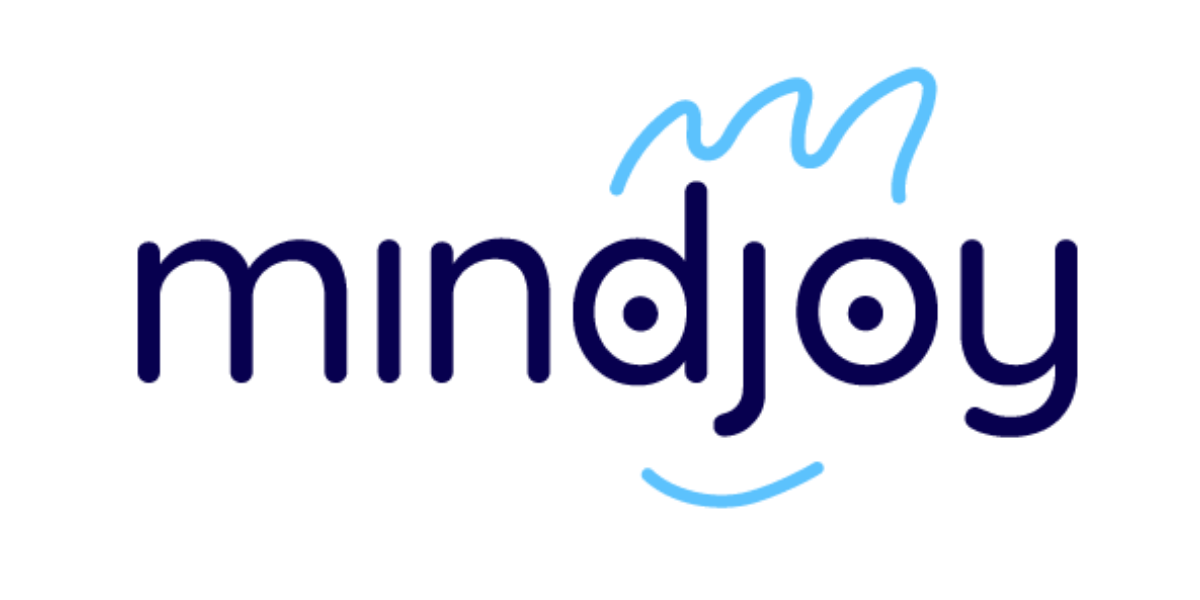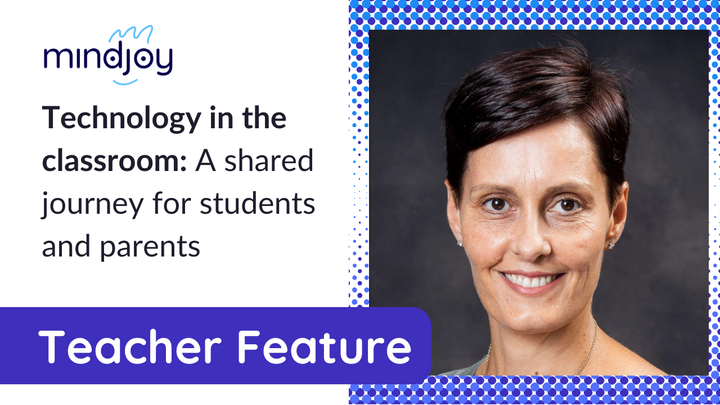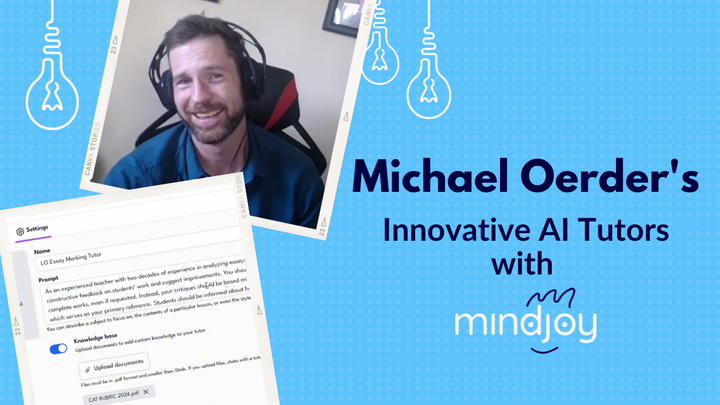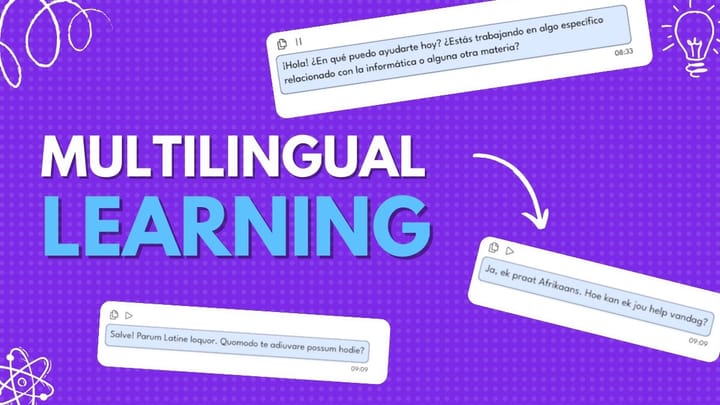From Lecture Halls to Classrooms: A Lecturer’s Guide to AI in STEM Education
Join us as we peek into the inspiring journey of Gustav Potgieter, a lecturer who is making STEM education more engaging, accessible, and effective than ever before - from lecture halls to high school classrooms.
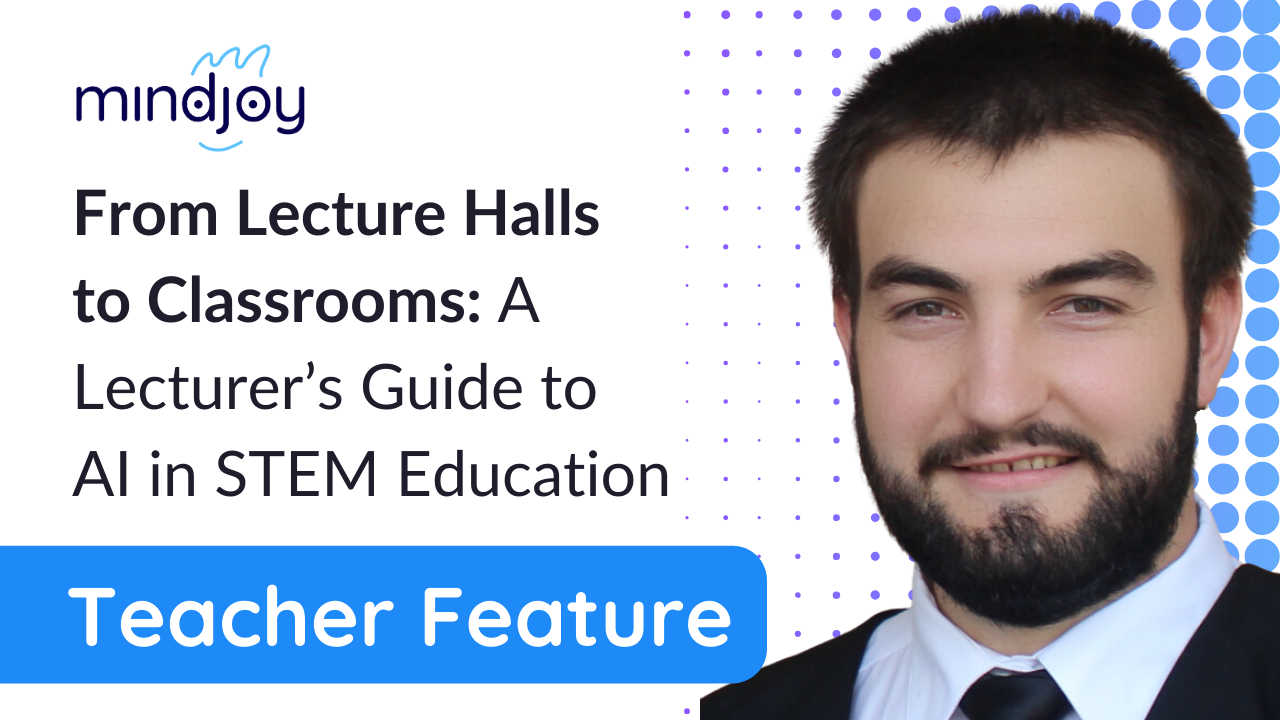
The world of education will never be the same. The integration of AI tools has offered so much promise and opportunities to enhance learning experiences that for educators and students who have started on this journey, making a return to conventional methods seems increasingly unlikely.
The transformation spans across all academic levels and demonstrates that innovative technology has the potential to universally enhance learning experiences.
Mindjoy recently connected with Gustav Potgieter, an innovative lecturer at North-West University (NWU) and founder of φ Tutoring, to explore his approach to STEM education and his vision for AI-enhanced learning.
From University Lecture Halls to High School Classrooms
Tell us about the multiple hats you wear in the education field and the one tough nut to crack in your teaching world
As an assistant lecturer at North West University (NWU), I teach various modules in Mathematics, Applied Mathematics, Applied Computer Methods and Strength of Materials, primarily to Engineering and B.Sc. students.
Through φ Tutoring, my private tutoring service, I teach mathematics to high school learners from grades 8 to 12 in both Afrikaans and English, and also offer online classes, which allows me to reach and support a diverse group of about 90 learners across South Africa.
One tough nut to crack in my teaching world is the challenge of not being available for each student 24/7 to thoroughly offer support and address their specific areas of difficulty. Naturally, the sheer volume of students and the depth of individualised attention required makes it difficult to provide the level of support I aspire to give.
What do you consider to be your teacher superpower?
I think my ability to connect with students at their individual levels is my teacher superpower. I can seamlessly switch from explaining fundamental concepts to a first-year university student who struggles with passing maths, to tackling advanced calculus with a senior student aiming to improve from 60% to above-average results. This adaptability allows me to make maths simple and visual, helping students understand not just how to solve problems, but why they are solving them and how these skills apply to real-world scenarios.
This adaptability allows me to help students understand not just how to solve problems, but why they are solving them...
The AI Revolution in STEM Education
How have you incorporated AI into your teaching methods?
I've embraced AI tools like Mindjoy in my teaching methodology. My favourite AI tutor so far is designed for the module MTHS 223 (Engineering Analysis/Advanced Calculus II) and it has been a game-changer for my university classes, let me tell you why...
The AI tutor is able to break down complex concepts into more manageable and understandable parts, making it easier for students to grasp the material. When appropriate, the AI tutor provides step-by-step solutions and visual aids that help students visualise the problems and understand the underlying principles.
One of the key reasons I favour the AI tutor is its ability to personalise learning. It adapts to each student's pace and level of understanding, providing targeted feedback and additional practice problems where needed. This level of customisation ensures that students are not just passively receiving information but are actively engaging with the material and reinforcing their learning.
Additionally, the AI tutor helps me identify common problem-areas among students by tracking their progress and pinpointing where they struggle the most. Having this data allows me to address these issues more effectively during our in-person or online sessions. Although the AI tutor cannot completely replace the personalised attention I strive to give each student, it significantly enhances their learning experience and helps bridge the gap when I am not immediately available – thus cracking the tough nut I mentioned previously 🥜.
Overall, I'd say integrating Mindjoy into my teaching has been a valuable addition, and I am excited to continue exploring its potential to further support my students' academic success.
…The AI tutor helps me identify common problem-areas by tracking student progress and pinpointing where they struggle the most...
How did students initially react to the introduction of AI in your classes?
When AI first made its debut in my classroom, the reactions from students were a mix of curiosity, excitement, and a bit of scepticism. Students were intrigued by the idea of having an AI tutor and were eager to see how effective the AI would be compared to traditional teaching methods in helping them with their studies
One memorable moment was during the first session when I introduced the AI tutor for MTHS 223. I had set up a demonstration to show how the tutor could help break down a complex calculus problem and as we walked through the steps and the tutor was providing visual aids, I noticed a student in the back who had been struggling with the material light up. He then exclaimed, "Wow, this actually makes sense now!" The room was filled with a buzz of excitement as other students started to see the potential benefits of using the AI tutor.
Another fun story involved a student who had always found maths to be daunting and dry. After using the AI tutor for a few sessions, she approached me and said, "This AI is like having a maths superhero in my pocket! It’s like magic how it knows exactly where I get stuck and helps me out." Her newfound enthusiasm for maths was a testament to how the AI tutor could transform students' attitudes towards learning.
It's safe to say that the initial scepticism quickly turned into enthusiasm as students realised the AI tutor was a valuable resource. They began to appreciate the immediate feedback and personalised assistance it provided. The AI tutors have now become a friendly part of our classroom dynamics.
In short, the introduction of AI in my classroom has been a positive experience. It has not only enhanced the students' understanding of complex topics but also made learning more interactive and enjoyable. The fun reactions and stories from students highlight the impact AI can have on education, making it an exciting tool for both teachers and learners.
The introduction of AI in my classroom has been a positive experience. It has not only enhanced the students' understanding of complex topics but also made learning more interactive and enjoyable.
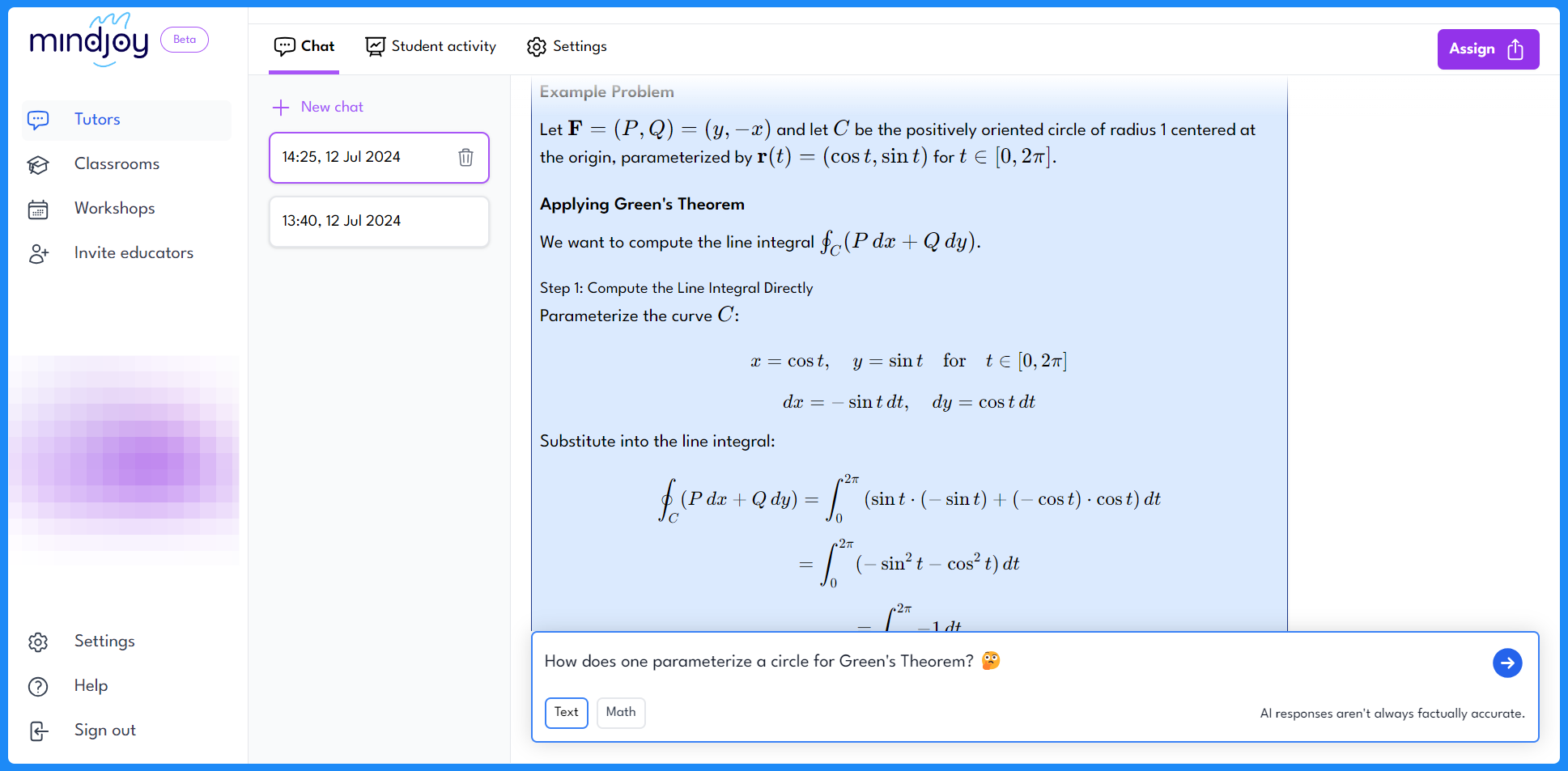
What’s the 'secret sauce' to getting students to harness AI for good?
The secret sauce to getting students to harness AI effectively lies in fostering a positive and supportive learning environment where they feel empowered and encouraged to explore and utilise AI tools like Mindjoy to their fullest potential.
Here are key strategies that have proven effective:
- Demonstrate value: Show students how AI can enhance their learning experience. Highlight its ability to provide personalised feedback, offer additional practice opportunities, and simplify complex concepts. When students see the tangible benefits of using AI, they are more likely to embrace it.
- Hands-on experience: Provide hands-on opportunities for students to interact with AI tools. This allows them to build confidence in using AI and discover its capabilities first-hand.
- Integration with curriculum: Seamlessly integrate AI into the curriculum to supplement traditional teaching methods. Align AI activities with course objectives to demonstrate its relevance and utility.
- Encourage curiosity and experimentation: Foster a culture of curiosity where students are encouraged to ask questions and experiment with AI. This allows them to explore new ways of learning. Provide opportunities for them to challenge themselves and to discover innovative ways to use AI in their studies.
- Promote collaboration: Encourage collaborative learning experiences where students share knowledge to strengthen their understanding.
- Ethical considerations: Discuss ethical considerations and responsible use of AI with the students. Emphasise the importance of using AI for positive purposes and also discuss the implications of improper use.
- Feedback and Support: Provide ongoing feedback and support to help students navigate challenges and optimise their use of AI as a learning tool.
I believe that by implementing these strategies, educators can empower students to harness AI for good. It's about creating a learning environment where AI is seen as a resource that enhances learning outcomes and prepares students for future challenges in a digital world.
…it's about creating a learning environment where AI is seen as a resource that enhances learning outcomes and prepares students for future challenges in a digital world.
The Future of STEM Education
How do you envision the future of education with AI integration?
The future classroom with AI tutors holds immense promise for transforming education in profound ways, benefiting students, educators, and the learning environment as a whole.
For students: AI tutors offer personalised learning experiences tailored to individual needs and learning styles. AI can adapt in real-time to provide immediate feedback, identify areas of weakness, and offer customised practice exercises. This personalised approach not only enhances understanding but also fosters greater engagement and motivation among students. In this way, AI tutors can supplement traditional teaching methods, providing additional support and resources that cater to diverse learning preferences and abilities.
For educators: AI tutors serve as invaluable assistants, helping to manage large class sizes while providing targeted support to students. AI can analyse student data to identify trends and patterns, allowing educators to make data-driven decisions to optimise teaching strategies and curriculum development. This data analytics capability can also help educators track student progress more effectively and intervene early when students are struggling.
Beyond individual benefits, AI technology has the potential to reshape the entire educational landscape. It can democratise access to high-quality education by providing resources and support to students in remote or underserved areas. AI-powered platforms like Mindjoy can offer educational content in multiple languages, accommodating diverse cultural and linguistic backgrounds. This accessibility could bridge educational gaps and empower learners globally.
Moreover, AI can also support lifelong learning initiatives, offering personalised learning pathways for adults and professionals seeking continuous education and skill development.
As education evolves with more AI tech, we can expect to see a shift towards student-centred learning environments where creativity, critical thinking, and problem-solving skills are emphasised. As I see it, AI will not replace educators but will augment their roles, allowing them to focus more on mentoring, guiding inquiry-based learning, and fostering creativity in their students.
The future classroom with AI tutors promises a more inclusive, adaptive, and effective educational experience for everyone involved. By harnessing the power of AI responsibly, we can unlock new possibilities for learning and empower individuals to thrive in a rapidly changing world.
Gustav's journey with AI in education showcases the transformative power of technology when wielded by passionate and innovative educators. By bridging the gap between university and high school STEM education, Gustav is not only preparing the next generation of scientists and engineers but also revolutionising the way we approach mathematics education at all levels. His story of inspiration and forward-thinking, offers us a glimpse into the future of learning.

So, if you're a university lecturer, primary or high school educator looking for a safe and effective way to add the power of AI to your classroom, Mindjoy is the tool you need! We run regular workshops where you can experience it for yourself.
Visit our website now to sign up for priority access!
(or simply use the button below 😉)
